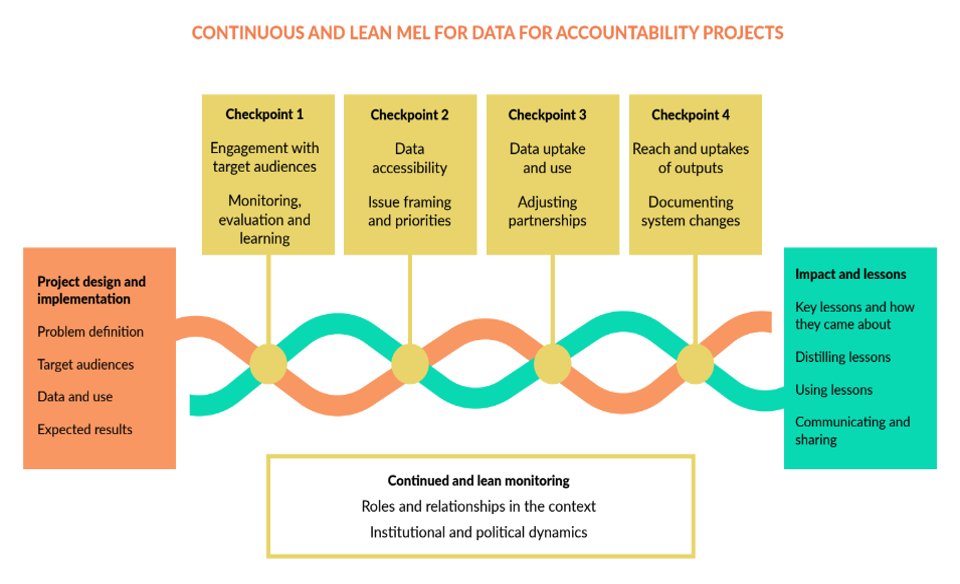This year has seen significant contributions to the data for development and open data conversations. For example, the Global Partnership for Sustainable Development Data’s new Data Values Manifesto is essential reading for those designing data projects. The Global Data Barometer helps give us an updated sense of the field, supplemented by many interesting analyses. On this International Day for Universal Access to Information, we at the Transparency and Accountability Initiative (TAI) and Global Integrity want to contribute to this conversation by launching the publication of the results of the Data for Accountability Initiative.
Our initiative was launched as an effort to generate evidence and recommendations for donors and reformers advancing the use of data for accountability. In addition to landscape scans, we supported multi-year data use projects in Colombia and Nigeria in partnership with Transparencia por Colombia, Corporación Comisión de Juristas Akubadaura, Human and Environmental Development Agenda and Public Private Development Centre. All had an embedded learning track.
So, what did we learn? A lot. While we our focus was on using data for government and corporate accountability, we believe the findings have resonance for data for development programming writ large. Here, we headline insights relating to 1) improving project design and implementation, 2) embedding learning into data project processes, and 3) how funders might strengthen the ecosystem for data programming.
How to improve data project design and implementation?
Our project experiences reaffirmed instincts already prevalent in the data community, namely:
- Focus on the problem to be solved or decision to be made by specific target audiences. Then mobilize data in service of that. For example, a community in Kaduna State in Nigeria needs specific contract data information in order to verify they receive the promised health facilities procured by the government.
- Integrate target audiences into project design while recognizing it can be resource intensive. For example, it might necessitate building local partner capacity to engage effectively. It pays off in terms of clarifying data needs and support required to effectively deploy that data.
- Strike a balance between demanding improvements and helping to facilitate change. Often in the development space, increasing the availability of data is a delicate political process that requires organizations to engage diverse government agencies by balancing demand for improvements and support to implement them.
- Acknowledge context, reforms, and political dynamics. Data can be part of your arsenal to shift the incentives of those involved towards solutions.
A framework for continued and lean monitoring, evaluation, and learning in data for accountability programming
Our in-depth country engagements revealed the need and challenges involved in measuring data use and impact, but we believe it worth investing to improve capacities and incentives to do it well. Shortchanging measurement, evaluation and learning (MEL) too often undermines outcomes.
We delineated a model for ongoing, lean MEL in data projects from start to finish (see Figure 1). We specify how reflection and adaptation can be used and documented at each project checkpoint, including examples of how adaptation might look like in practice and how to communicate, use, and share lessons. This framework is meant to inform work by in-country reformers and to provide a solid basis to inform follow-up conversations by these reformers and their donors and supporters.
Figure 1.

Are you funding data-use programming? Suggestions for strengthening the ecosystem
Given the involvement of a funder collaborative in supporting this exploration, we wanted to pinpoint recommendations for those investing in data-related programming (which we assume often span geographies and themes). You can see a full list of suggestion in our overview report – and specific suggestions for Nigeria and Colombia in the respective reports – but among those we would prioritize are:
- Create incentives for aligning global, national, and local work in the use of data on a specific issue (in our case the push for accountability)
- Enable peer learning specifically around use of data across global and local organizations working on a shared issue (e.g,. anti-corruption).
- Assure there is funding for MEL within projects that involve significant data use.
- Invest in generating evidence about the power dynamics and relationships that perpetuate a development problem (e.g., service delivery failure and exclusion) and then the ways in which data can contribute to shifting them.
Let us know how these match your own experiences.
For further reading:
- Effective Data Use: Lessons from Data for Accountability Projects (Full report)
- Mobilizing Citizens to Investigate corruption and demand government action in Nigeria
- Strengthening Transparency and Citizen Engagement in the Allocation and Use of Natural Resource Revenues in Colombia (Spanish/English)